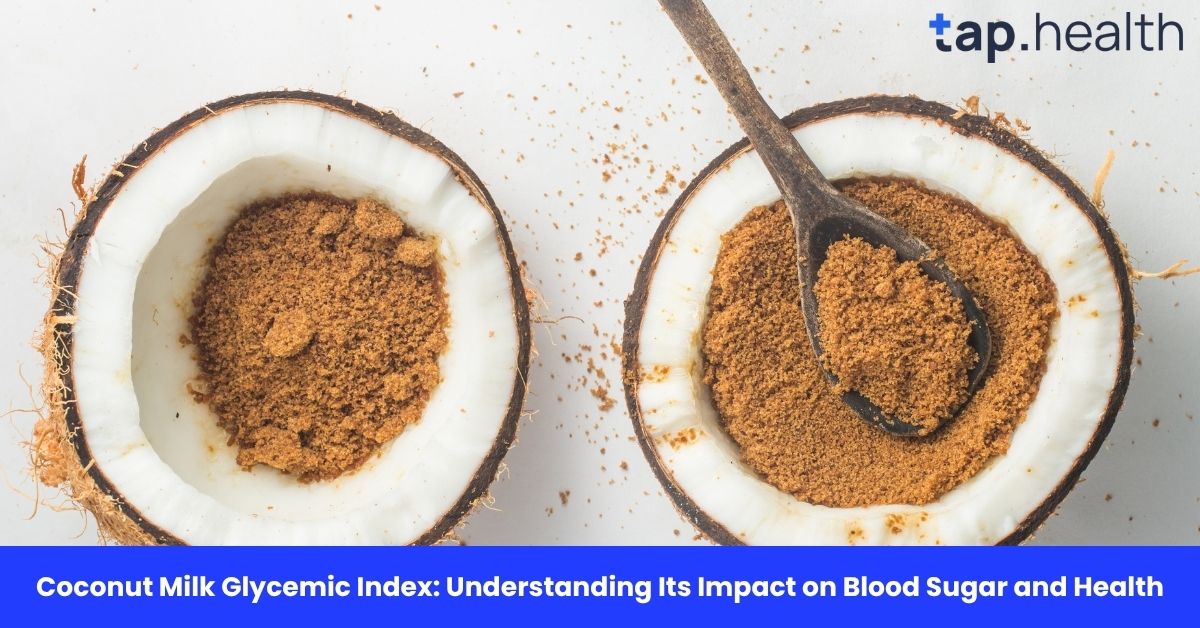Coconut milk is a staple ingredient in many dishes, particularly in Southeast Asia, and it has recently gained popularity in health-conscious communities worldwide. Known for its rich taste and numerous health benefits, coconut milk is often recommended as an alternative to dairy milk. However, when it comes to managing blood sugar levels, especially for people with diabetes or those seeking a low-glycemic diet, understanding the glycemic index (GI) of coconut milk is crucial.
In this comprehensive guide, we will explore the glycemic index of coconut milk, its health implications, its role in managing blood sugar levels, and clear up any myths that surround its consumption. Whether you’re diabetic, health-conscious, or simply curious about the food’s effect on your blood sugar, this article will provide valuable insights.
What is the Glycemic Index (GI)?
Before diving into the specifics of coconut milk’s glycemic index, let’s first understand what the glycemic index is.
The glycemic index is a measurement used to determine how quickly a particular food increases blood sugar levels after consumption. Foods with a high GI are rapidly digested and absorbed, causing a sharp spike in blood sugar, while those with a low GI are digested more slowly, leading to a gradual increase in blood sugar.
The GI scale ranges from 0 to 100:
- Low GI foods: 55 or less (e.g., most fruits, legumes, and whole grains).
- Medium GI foods: 56-69.
- High GI foods: 70 or more (e.g., white bread, sugary snacks).
Now that we understand the GI, let’s explore the glycemic index of coconut milk.
Coconut Milk Glycemic Index: Is It Low or High?
Coconut milk has a glycemic index that is typically considered low. According to available data, the GI of coconut milk generally ranges between 35 and 50. This puts it in the low GI category, making it a suitable option for people looking to manage their blood sugar levels.
Coconut milk contains minimal carbohydrates compared to other milk alternatives, especially when compared to regular cow’s milk or sweetened plant-based milks. The low GI is primarily due to the high fat content in coconut milk, which slows the absorption of sugars into the bloodstream.
Health Benefits of Coconut Milk for Blood Sugar Control
1. Low Glycemic Index for Diabetic-Friendly Diet
Because of its low glycemic index, coconut milk is often considered a safe alternative for people with diabetes or those who are managing their blood sugar levels. The fats and minimal carbs in coconut milk help prevent spikes in blood sugar, making it a viable option for inclusion in a diabetic-friendly diet.
2. Rich in Medium-Chain Triglycerides (MCTs)
Coconut milk contains MCTs, a type of fat that is metabolised differently from long-chain fatty acids. MCTs are converted into ketones, which can provide an alternative energy source for the body. This process helps in controlling blood sugar levels and may even support weight management, a key consideration for diabetics.
3. Supports Heart Health
While coconut milk is high in saturated fats, research suggests that the type of saturated fat in coconut milk—specifically lauric acid—may have a positive impact on heart health by improving cholesterol levels. For individuals managing both blood sugar and cholesterol levels, coconut milk may offer dual benefits.
4. Rich in Essential Nutrients
Coconut milk is rich in vitamins (such as vitamin C, E, and several B vitamins) and minerals like potassium and magnesium, which are beneficial for overall health. Potassium is especially important for maintaining proper electrolyte balance and supporting heart function.
Myths vs. Facts: Debunking Common Misconceptions About Coconut Milk
Myth 1: Coconut Milk Causes High Blood Sugar Levels
It’s a common misconception that coconut milk causes a spike in blood sugar due to its fat content. However, as we’ve already established, coconut milk has a low glycemic index, making it unlikely to cause a spike in blood sugar when consumed in moderation.
Myth 2: Coconut Milk is Unhealthy Due to Saturated Fat
While coconut milk is high in saturated fat, not all saturated fats are bad for health. In fact, the lauric acid found in coconut milk can support heart health by increasing good cholesterol levels (HDL). The key is moderation.
Myth 3: Coconut Milk is High in Calories
Coconut milk does have a higher calorie content than some other milk alternatives, but it’s also more nutrient-dense. In moderation, it can be part of a healthy diet without contributing to weight gain. It’s important to remember that calories from healthy fats are different from those from refined sugars and processed foods.
Is Coconut Milk Suitable for a Low-Carb or Keto Diet?
Coconut milk is an excellent option for those following a low-carb or keto diet. With only 2-4 grams of carbs per serving, coconut milk fits well into a low-carb meal plan, as it doesn’t cause significant spikes in blood sugar. Furthermore, the high-fat content helps you meet your daily fat requirements, a cornerstone of keto and low-carb diets.
How to Use Coconut Milk for Blood Sugar Management
Coconut milk can be used in a variety of ways to help manage blood sugar levels. Some ways to incorporate coconut milk into your diet include:
- Smoothies: Blend coconut milk with low-GI fruits like berries, spinach, and avocado for a blood sugar-friendly smoothie.
- Curries and Soups: Use coconut milk as a base for curries, soups, and stews, which are common in Indian cuisine.
- Baking: Substitute regular milk with coconut milk in baking recipes to reduce the glycemic load.
- Coffee or Tea: Add coconut milk to your morning coffee or tea as a creamy, sugar-free alternative to regular milk.
Coconut Milk vs. Other Milk Alternatives: A Comparative Look
Let’s compare the glycemic index of coconut milk with other common milk alternatives to give you a clearer picture of where it stands.
| Milk Type | Glycemic Index (GI) | Carbohydrates (per 100ml) |
|---|---|---|
| Coconut Milk | 35-50 | 2-4 grams |
| Almond Milk | 30-40 | 0-2 grams |
| Soy Milk | 34-40 | 3-5 grams |
| Rice Milk | 86 | 9-10 grams |
| Oat Milk | 60-70 | 12-15 grams |
As shown, coconut milk ranks well when compared to rice milk or oat milk, which have significantly higher glycemic indexes and carbohydrate content.
Precautions When Using Coconut Milk
While coconut milk is a great choice for blood sugar management, there are some precautions to keep in mind:
- Moderation is Key: While coconut milk is a healthy fat source, its high calorie content means you should consume it in moderation to avoid excessive calorie intake.
- Check for Added Sugars: Some commercial coconut milk products may contain added sugars. Always read labels and opt for unsweetened coconut milk when possible.
- Allergy Awareness: If you have a nut or tree nut allergy, make sure the coconut milk you purchase is free from cross-contamination.
Key Takeaways
- Coconut milk has a low glycemic index, making it a great choice for those looking to manage their blood sugar levels.
- The MCTs in coconut milk offer additional health benefits, such as improved metabolism and weight management.
- While rich in saturated fats, the type of fat in coconut milk is beneficial for heart health.
- Always opt for unsweetened coconut milk to avoid unnecessary added sugars.
- Coconut milk can be a versatile ingredient in smoothies, curries, and baked goods, especially for people following low-carb or keto diets.
Frequently Asked Questions (FAQs)
What is the glycemic index of coconut milk?
Coconut milk typically has a glycemic index between 35 and 50, making it a low GI food that is suitable for blood sugar management.
Can coconut milk raise blood sugar?
No, coconut milk has a low glycemic index and is unlikely to cause significant spikes in blood sugar levels when consumed in moderation.
Is coconut milk good for diabetics?
Yes, coconut milk is a good choice for diabetics due to its low glycemic index, which helps prevent blood sugar spikes.
Can coconut milk be used in a keto diet?
Yes, coconut milk is an excellent choice for a keto diet due to its low carbohydrate content and high fat content, which aligns with keto principles.
Does coconut milk have added sugar?
Some commercial coconut milk products may contain added sugars. Always choose unsweetened coconut milk to avoid unnecessary sugar intake.
How many carbs are in coconut milk?
Coconut milk contains about 2-4 grams of carbohydrates per 100ml, making it a low-carb alternative to other milks.
Is coconut milk high in calories?
Coconut milk is calorie-dense due to its fat content, but when used in moderation, it can be part of a healthy diet without leading to weight gain.
What are the health benefits of coconut milk?
Coconut milk is rich in MCTs, vitamins, and minerals and may support heart health, blood sugar management, and overall nutrition when included in a balanced diet.



